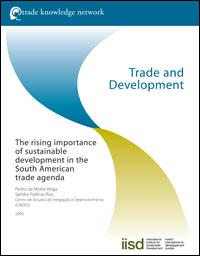| 来源类型 | Paper
|
| 规范类型 | 论文
|
| Trade and Development: The rising importance of sustainable development in the South American trade agenda |
| Pedro da Motta Veiga; Sandra P. Rios
|
| 发表日期 | 2009-04
|
| 出版者 | IISD
|
| 出版年 | 2009
|
| 语种 | 英语
|
| 概述 | Latin American countries have historically adopted a defensive stance in trade forums when it comes to topics related to sustainable development... |
| 摘要 |
Latin American countries have historically adopted a defensive stance in trade forums when it comes to topics related to sustainable development, tending to see protectionist intentions behind the efforts to link environmental and labor issues to trade negotiations. However, the situation of such countries has changed significantly over recent years. Several countries in the region have accepted the inclusion of chapters dedicated to environmental and labor topics in the free-trade agreements (FTAs) they signed with the United States and Canada. Simultaneously, the level of demand defined by such agreements has increased gradually, as can be confirmed through a comparison between some of the older agreements (such as the agreement between the United States and Chile, for example) and the more recent ones (such as that between the United States and Peru).
This report synthesizes the findings of a joint TKN-CINDES research project comprising of four national case studies - of Argentina, Brazil, Chile and Peru - undertaken to identify within the thematic areas of environmental and labor regulation the most important issues for each country in terms of opportunity and/or vulnerability, as well as the forces that prompted the introduction of sustainable development topics into the countries' trade and investment agendas. The individual country reports are also available through the Trade Knowledge Network website.
Key points:
-
There are certain characteristics of the countries mentioned here that tend to "push" sustainable topics onto the trade agenda, even when the government's official position refuses to accept such a link; these are: (1) the concentration of exports in those sectors requiring the intensive use of energy and natural resources, and the (2) continued practice of archaic work relations and the importance of informal work in some of these economies. Said characteristics make these countries vulnerable to the establishment of voluntary or compulsory unilateral rules in the importing countries.
-
Regardless of their postures in relation to the link between environmental and trade topics, the governments of the region are already dealing, in fact or potentially, with the issues raised by them. Multilateral environmental agreements have explicit trade-centered provisions, and specific provisions of trade agreements, such as the WTO, deal with environmental concerns. With the expansion of the climate change agenda, this interaction will likely become more intense over the years to come.
Key recommendations:
-
Since the definition of new technical standards and regulations implies high adaptation costs for regional producers, it is crucial to analyze the impact these standards may have on the export capacity of these countries and the best strategies for negotiating standards, regulations and certification mechanisms in trade agreements.
-
Due to the importance of agricultural and fuel products in the exports of these countries, the implications arising from specialization and the "primarization" of the production structure must be further addressed. In the area of energy, the relationship between energy security, trade and investments has become a sensitive topic in the relations between the countries.
-
The growing attention to "non-trade concerns" in the Northern countries will imply the incorporation of increasingly demanding obligations in future free trade agreements. The evaluation of what the eventual introduction of such topics into the thematic WTO agenda could represent for the region's countries is also a relevant field of study for the region.
-
The possible transfer of more carbon-intensive industries and sectors to the countries of the region may incite the introduction of "filters" for the entry of these investments. More debate is needed as to the dilemma between introducing new barriers to investment due to environmental concerns and the compliance to commitments negotiated in trade and investment agreements.
|
| URL | https://www.iisd.org/library/trade-and-development-rising-importance-sustainable-development-south-american-trade-agenda
|
| 来源智库 | International Institute for Sustainable Development (Canada)
|
| 资源类型 | 智库出版物
|
| 条目标识符 | http://119.78.100.153/handle/2XGU8XDN/56957
|
推荐引用方式
GB/T 7714 |
Pedro da Motta Veiga,Sandra P. Rios. Trade and Development: The rising importance of sustainable development in the South American trade agenda. 2009.
|
|
文件名:
|
tkn_trade_south_america.jpg
|
|
格式:
|
JPEG
|

|
文件名:
|
tkn_trade_south_america.pdf
|
|
格式:
|
Adobe PDF
|
|
文件名:
|
tkn_trade_south_america_es.pdf
|
|
格式:
|
Adobe PDF
|
|
文件名:
|
tkn_trade_south_america_pt.pdf
|
|
格式:
|
Adobe PDF
|
除非特别说明,本系统中所有内容都受版权保护,并保留所有权利。